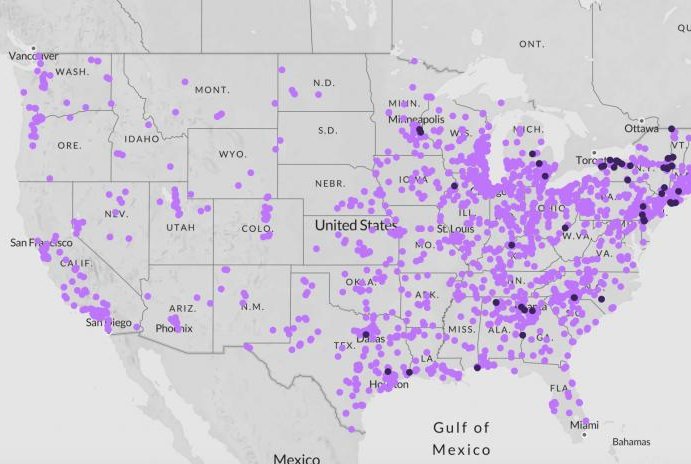
More than 2,500 industrial sites in the United States are likely releasing toxic PFSAs linked to cancer and other human health problems, a new analysis of federal data shows. Photo courtesy of Environmental Working Group
April 9 (UPI) -- More than 2,500 industrial operations in the United States most likely are releasing toxic perfluoroalkyl chemicals, or PFAS, into air and water supplies, a report based on federal data says.
The Washington, D.C.,-based Environmental Working Group, a non-profit that advocates for clean air and water, on Thursday released an interactive national map of likely polluters.
The list came from two online databases compiled by the U.S. Environmental Protection Agency, along with data from a 2017 survey by New York state.
Industrial sources of PFASs include chemical producers, tanneries, carpet and rug mills, coated-paper-product plants, electroplating facilities, semiconductor factories and wire manufacturers, the organization said.
RELATED Elevated PFAS levels found in tap water in major U.S. cities
PFAS, also dubbed "forever chemicals," are a family of chemical compounds that have been linked to human health problems, including cancer, liver damage, decreased fertility, and an increased risk of asthma and thyroid problems.
Congress has mandated that the EPA next year require companies to report their releases of PFASs as part of their mandatory Toxic Release Inventory.
But some lawmakers want the EPA to do more.
RELATED PFAS should be classified as carcinogens, researchers say
U.S. Rep. Chris Pappas, D-N.H., has also proposed a bill that add mandatory reporting of PFSAs to the chemical pollutants listed in the EPA's Clean Water Act.
"In our district [people] have questions about whether they can bathe their kids or drink water in their house," Pappas said on a telephone press conference Thursday.
"We can't do this community by community and state by state. It's critically important that we have federal maximum contaminant level," Pappas added. "We should look for ways to provide [federal] funding for additional testing."
RELATED Many household drinking water filters fail to totally remove PFAS
In Pappas's district in Merrimack, N.H., a state water investigation found PFASs released by smokestacks from the French-owned Saint-Gobain Performance Plastics company over decades had contaminated water supplies for 60 miles in southern New Hampshire.
The company applies PFSA-laden water-repelling surfactant when manufacturing plastics like tape, films, seals and textiles.
Contaminated wells were found in the towns of Bedford, Londonderry, Manchester and Litchfield, said Jim Martin, spokesman for the New Hampshire Department of Environmental Services.
"This has turned out to be the largest groundwater investigation in the history of New Hampshire where PFASs have impacted hundreds of wells," Martin said.
A chemical signature identified Saint-Gobain as the source of the water contamination, Martin said. State health agencies found elevated levels of PFASs in blood samples from regional residents who lived near the factory.
Under a 2018 consent decree, the company has paid to disconnect 700 homes from private wells and connect them to treated municipal water systems. The company also has also paid for private home water filtering systems and has provided bottled water to other homes, Martin said.
PFASs are used commercially in stain repellents on carpets and other fabrics, polishes, paints and coatings such as non-stick Teflon on pots and pans. Some PFSAs have been banned by the United States and other countries, but the toxic "forever chemicals" remain in soil and water.
On more than 670 U.S. military sites, PFSA water contamination nearby was linked to chemicals used in fire-retardant foams. Military bases around the country have been deemed EPA Superfund sites to clean up water contamination from PFSAs.
U.S. Rep. Harley Rouda, D-Calif., pointed out Thursday that the new map showed the industrial PFAS contamination problem reached into every state and congressional district.
"Unfortunately our watershed knows no boundaries," Rouda said. "Unless we have federal action, we can't do more to reduce ongoing levels of PFAS and make sure legacy polluters are accountable for contamination."


No comments:
Post a Comment